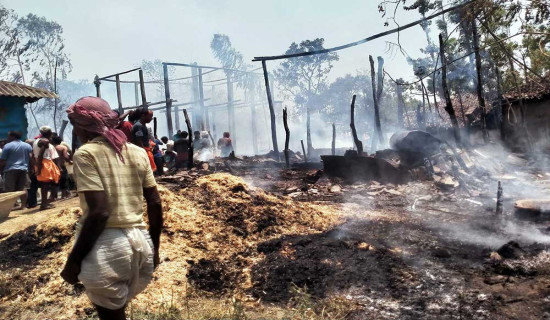- Thursday, 2 May 2024
Nepal All Set To Enter Tunnel Era
If not for everyone, at least the people living in Kathmandu and nearby districts, have received in some ways, good news with the ushering in of the new Nepali Year of 2081 BS. The first news is the final breakthrough in the opening of the tunnel linking a highly congested area in the gateway of Kathmandu to the highway at a place in Dhading. The other is the decision to open two highly commercial and touristic places of Kathmandu for twenty four hours daily. Both these news have been welcomed by most people and they expect better things to happen in the country in the years to come. Of course there are some who are not happy, especially with the decision to open Thamel and Durbar Marga for twenty four hours, but for a country like Nepal, which wishes to further develop its tourism sector, this is a positive development.
Nepal opened up to the world very late and thus, it has to do a lot of catching up to meet many of its development targets and giving a boost to various industries, which are all contributing for the country's development. The tourism sector is one such industry where quick returns can be made by entrepreneurs and at the same time provide employment to a lot of individuals. Providing employment opportunities has come as one of the major challenges for the government and it is a sad aspect that thousands of Nepali citizens are opting to go abroad seeking 'greener pastures'. The trouble is that not only unskilled labourers, but skilled individuals on whom the state in one way or the other has invested a lot, are also leaving the country. This situation must be addressed and it is the government which should take the initiative to do this.
Sad situation
There are constant reports in the media of how many villages in different parts of the country do not have youths or strong manpower and the land which sustained many families are now lying fallow. This is a sad situation in an agriculture based country like Nepal. It is further sad that Nepal now has to import rice and lentils, which are the staple diet of the majority of Nepalis. It is an irony that Nepal in the past used to export these very agricultural products to different countries from where now we have to import even vegetables, which is another essential item in the daily meals of the citizens of this country.
So any opening, whether it is a tunnel linking different villages or highways or whether it is the twenty-four hour opening up of some famous commercial and touristic sites in historic Kathmandu, they are welcome developments. First, the opening of the first ever tunnel road linking the capital city with a village on the highway in Dhading district, is good in many ways, not only in saving time for travellers, but also in cutting down of the import of crude fossil fuels which Nepal has to import from different countries, making a huge dent in its foreign currency reserves. This official 'breakthrough' was initiated by Prime Minister Pushpa Kamal Dahal Prachanda, amidst a formal function a few days back.
The tunnel road will also play an important role in joining different places in this mountainous country with difficult terrain. Nepal has now entered the 'tunnel age' with this opening and it will bring other developments also. It is expected that trade and work opportunities will be made easier by this tunnel which will ease the travelling distance and also the constant jams we see both in the cities, especially Kathmandu, and all parts of the country which the Highway touches. Thousands of buses and other vehicles ply on this highway, which sees almost daily traffic snarl-ups and causes hardship to the passengers and the drivers of vehicles as well. Furthermore, it is also expected to reduce accidents of all kinds, including landslides during the monsoon season, after it opens for all vehicles in about a year's time.
The decision to allow the two famous areas of Thamel and Durbar Marga to stay open for twenty four hours every day is also a welcome move for the traders as well as tourists and also for the short time local travellers who arrive in Kathmandu in the night and move on to their destinations the very next morning by making Thamel only a 'transit' point, though they want to see it and also do some shopping during the night. It will also be a boon for the late night lovers, who just want some place to go for a meal or just bask in the ambiance of the place.
Water-tight security
But like warned by some experts and also local traders, the authorities will have to be very vigilant about these places providing water-tight security to both tourists and locals. If possible, the authorities must also coordinate with local bodies to provide adequate transport services, so that the late nighters will not have any problems in going back to their homes or tourists who have to reach their hotels.
There are many cities around the world which stay open all night but which also see a lot of criminal activities, thus the presence of alert security personnel is a must for this venture to be successful and bear fruit. It can be understood that some residents, especially in Thamel, are not happy because of the disturbance they will have to put up with the presence of people during the night time also. But the traders seem to be happy, but they are still following a 'wait and watch' policy. For now, we must all be positive about these two new developments in the country and expect that both these decisions will contribute a lot in giving some support to its otherwise tottering economy.
(The author is former chief editor of this daily.)














